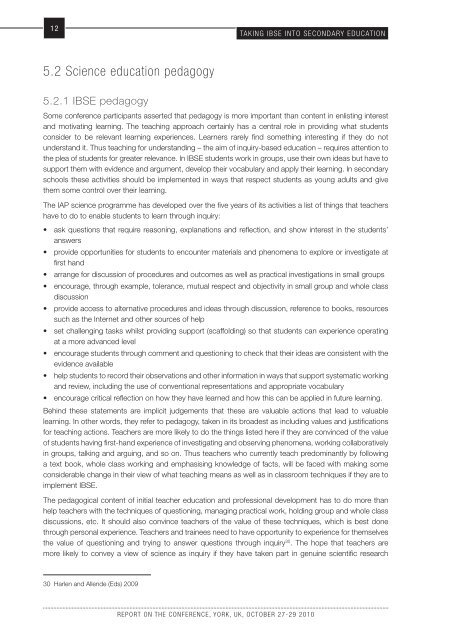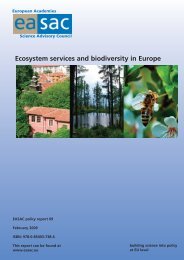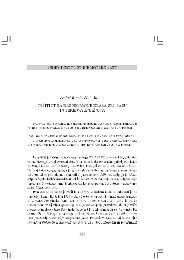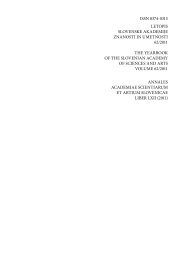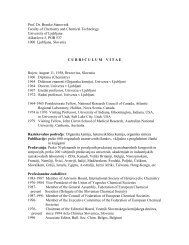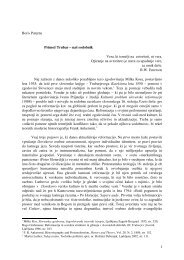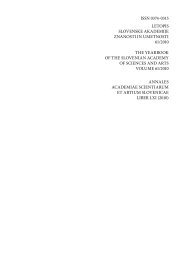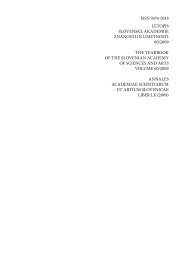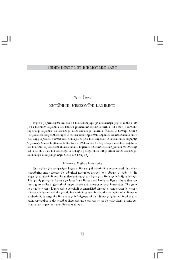Taking Inquiry-Based Science Education into Secondary ... - SAZU
Taking Inquiry-Based Science Education into Secondary ... - SAZU
Taking Inquiry-Based Science Education into Secondary ... - SAZU
Create successful ePaper yourself
Turn your PDF publications into a flip-book with our unique Google optimized e-Paper software.
12<br />
<strong>Taking</strong> IBSE <strong>into</strong> <strong>Secondary</strong> <strong>Education</strong><br />
5.2 <strong>Science</strong> education pedagogy<br />
5.2.1 IBSE pedagogy<br />
Some conference participants asserted that pedagogy is more important than content in enlisting interest<br />
and motivating learning. The teaching approach certainly has a central role in providing what students<br />
consider to be relevant learning experiences. Learners rarely find something interesting if they do not<br />
understand it. Thus teaching for understanding – the aim of inquiry-based education – requires attention to<br />
the plea of students for greater relevance. In IBSE students work in groups, use their own ideas but have to<br />
support them with evidence and argument, develop their vocabulary and apply their learning. In secondary<br />
schools these activities should be implemented in ways that respect students as young adults and give<br />
them some control over their learning.<br />
The IAP science programme has developed over the five years of its activities a list of things that teachers<br />
have to do to enable students to learn through inquiry:<br />
• ask questions that require reasoning, explanations and reflection, and show interest in the students’<br />
answers<br />
• provide opportunities for students to encounter materials and phenomena to explore or investigate at<br />
first hand<br />
• arrange for discussion of procedures and outcomes as well as practical investigations in small groups<br />
• encourage, through example, tolerance, mutual respect and objectivity in small group and whole class<br />
discussion<br />
• provide access to alternative procedures and ideas through discussion, reference to books, resources<br />
such as the Internet and other sources of help<br />
• set challenging tasks whilst providing support (scaffolding) so that students can experience operating<br />
at a more advanced level<br />
• encourage students through comment and questioning to check that their ideas are consistent with the<br />
evidence available<br />
• help students to record their observations and other information in ways that support systematic working<br />
and review, including the use of conventional representations and appropriate vocabulary<br />
• encourage critical reflection on how they have learned and how this can be applied in future learning.<br />
Behind these statements are implicit judgements that these are valuable actions that lead to valuable<br />
learning. In other words, they refer to pedagogy, taken in its broadest as including values and justifications<br />
for teaching actions. Teachers are more likely to do the things listed here if they are convinced of the value<br />
of students having first-hand experience of investigating and observing phenomena, working collaboratively<br />
in groups, talking and arguing, and so on. Thus teachers who currently teach predominantly by following<br />
a text book, whole class working and emphasising knowledge of facts, will be faced with making some<br />
considerable change in their view of what teaching means as well as in classroom techniques if they are to<br />
implement IBSE.<br />
The pedagogical content of initial teacher education and professional development has to do more than<br />
help teachers with the techniques of questioning, managing practical work, holding group and whole class<br />
discussions, etc. It should also convince teachers of the value of these techniques, which is best done<br />
through personal experience. Teachers and trainees need to have opportunity to experience for themselves<br />
the value of questioning and trying to answer questions through inquiry 30 . The hope that teachers are<br />
more likely to convey a view of science as inquiry if they have taken part in genuine scientific research<br />
30 Harlen and Allende (Eds) 2009<br />
Report on the conference, York, UK, October 27-29 2010


